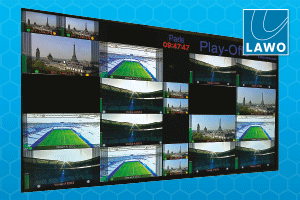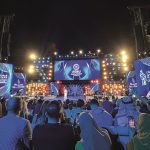ASBU celebrated its 50th anniversary this year at the Arab Radio and TV Festival in Tunis, with events planned throughout the year to commemorate the occasion.
In an exclusive chat with BroadcastPro ME, ASBU Director General Abdelrahim Suleiman shares some of the organisation’s recent milestones and its technical strategy for the year ahead.
Congratulations on ASBU’s 50th anniversary. How was this edition of the event different from previous years?
Indeed, it was a fabulous reunion that brought to Tunis all the people who made a difference in ASBU’s history – former employees, professional partners, political figures, artists and various colleagues from around the world. This was ASBU’s way of saying thank you.
The celebration of the 50th anniversary (1969-2019) was launched during the Arab Radio and TV Festival (June 27-30), but will continue all year long. Several events and actions were undertaken and will be organised. They mainly include the production of a video documentary on ASBU’s achievements and the difficulties it had to face during half a century; a book on ASBU’s history; a document exhibition inaugurated during the Festival; and several workshops, seminars and meetings to highlight, discuss and assess what ASBU has achieved or failed to achieve, the challenges ahead, and the programmes and the future orientations in which it is engaged. A number of professional training sessions are also scheduled to take place in different Arab countries.
How has OTT been received in this market, and is ASBU looking closely at this segment?
ASBU OTT services have been provided on an international level through an agreement with GLArab, which is available on www.glarab.com. This service may be received on IP receivers, mobile and fixed PC services. Approximately 47 Arab TV stations are broadcast on the platform. Our audience time has grown over the years to around 2.5m viewing hours, where the majority of audience is in North America, besides Australia and East Asia. On a regional level, our members are starting small networks over the internet, while others are looking into a more cost-effective solution over HbbTV 1.5. The latter requires the availability of smart TVs or IP set-top boxes.
Who were the big winners at the Festival this year?
For the second year in a row, the Festival’s organising committee has chosen to entrust the arbitration of its com-petitions to an independent jury made up of Arab experts in various fields of radio and TV content production. The impact on the results was enormous. Competitors were mostly happy with the award distribution, a wide variety of programmes and TV and radio channels won the prizes, most sub-regions in the MENA area and abroad (China, BBC) were present on the podium, and the award distribution ceremony was enthusiastic. The award-winning programme themes mostly focused on TICs and science, new media and awareness-raising content.
You implemented the cloud last year. How has that evolved, and how has MENOS been updated to improve service for members?
MENOS Plus has evolved in a way that allows ASBU to cut its operational costs considerably and utilise its spectrum resources efficiently. At the same time, our members enjoy HD quality and low-latency contribution. Now, ASBU is looking to upgrade its radio exchange network.
In parallel, ASBU has started its cloud services deployment in order to meet the immediate needs of its members for fast and unmanaged internet-based contribution, with free access anywhere, anytime, while building a future-proof IP platform. There are, however, some challenges to securing the most feasible economical solution, as we have to meet more demands with the same or even sometimes lesser cost. ASBU is providing the service smooth-ly where about 10% of the news exchange takes place on this platform, although we are slowly widening our reach globally.
What new technical improvements and strategic plans do you have for ASBU?
ASBU is facing real challenges with introducing new services and technology to our members. IP, UHDTV and HDR, as well as accessibility for all members, are on the cards. Artificial intelligence for more personalised content is also on the top of the agenda. ASBU has moved one step forward in producing a guideline to introduce Access service, so as to incentivise our members to serve all of the citizens. As part of this, we are also looking to use a unified arti-ficial intelligence platform to allow speech to text and text to speech, so that our members can depend on the automation process for creating accessible content with minimal human intervention for creating the final product, thus reducing the production cost. Similarly, we are producing guidelines to introduce new IP-based live production in our members’ area.
What courses is the ASBU academy offering, and how do they help the community?
Since its launch in April 2017, the ASBU Media Training Academy has worked on two parallel axes to achieve its objectives. It first focused on designing a comprehensive strategy to improve the academy’s performance, finalise its departments and enhance its impact, by pursuing academic methods based on the most up-to-date training curricula and partnering with prestigious international training organisations. Secondly, the academy has designed a comprehensive training programme based on the needs defined by member corporations, to keep abreast of the technological challenges in the fields of digital media, and to maintain and improve their role in the media landscape.
We have completed 63 training sessions so far, including decentralised courses from the annual programmes and on-demand, on-site courses to support corporations that lack financial resources. 847 trainees from 28 countries and 76 corporations participated in these sessions. Most training courses use an interactive method that integrates both theoretical and practical content, as well as the latest technology and equipment.
What is the Chinese connection? China seems to have a big presence at the Festival every year.
Yes, we have had Chinese participation for the fourth year in a row at the Arab Radio and TV Festival with a large dedicated pavilion, and this represents one of the event’s key highlights. We are all aware of how active the Chinese audiovisual industry is throughout the world. At ASBU, we would like to play a leading role in channelling the overall cooperation between China and the Arab region in the field of radio and TV. Several cooperation texts have been signed by ASBU and various Chinese institutions, including a Memorandum of Understanding (MOU) with China’s International TV Corporation.
ASBU also participated in the 2018 Belt & Road Media Community Summit Forum, held on September 14-15, 2018 in China. The Chinese pavilion attracts scores of interested Arab visitors, including radio and TV officials, production companies, representatives, professionals and experts. Several joint ventures and cooperation projects were finalised during those visits.
When is the next Festival scheduled to be held?
The next edition will be held in mid-June 2020 at the City of Culture in Tunis.
















































































